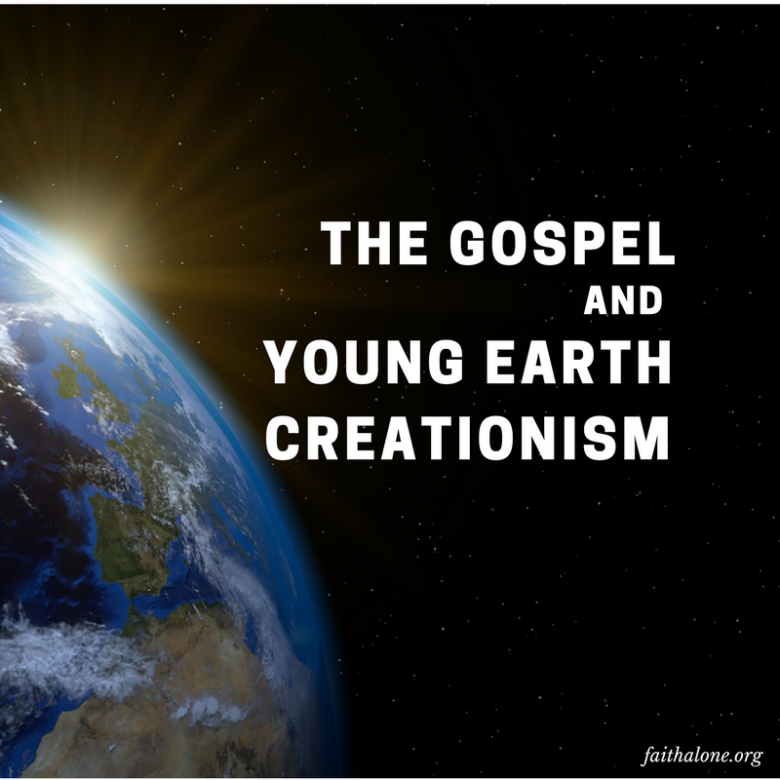I believe in a young earth. Such people are called Young Earth Creationists (YEC’s). I believe that the Earth and Adam and Eve were created just as Genesis 1-2 tells us, in six literal 24-hour days, about 6,200 years ago (around 4,200 BC).
See Paul Tanner’s article, available on our website, defending YEC, here.
I think I am in the minority among Free Grace people on YEC. Many pastors I meet believe in an old, or older, earth.
We get the Institute for Creation Research (ICR) magazine, Acts & Facts, at the office. The lead article for the December 2017 issue is entitled, “The Gospel and ICR.” It is by Brian Thomas.
The article is, IMO, both good and bad.
On the good side, I agree that believing the promise of life as found in John 3:16 and many other texts is related to believing in the truthfulness of the creation account. Thomas says, “Once Christians begin to deny the timing of creation in Genesis, they start to deny other Genesis events that fortify our understanding of the gospel. They start asserting that death was around before Adam’s sin and that the Flood covered mere regions rather than the whole globe. Why trust what Scripture says about the Lord Jesus saving us from our sins through His historical death and resurrection if science says we cannot trust what Scripture says about the historical death of Adam or the historical deaths of those who refused to repent and be saved aboard the Ark?” (p. 6).
Of course, there are many old earth creationists (OEC’s) who do believe that Jesus died on the cross for our sins and rose bodily from the dead and who believe in the promise of everlasting life. But Thomas is correct that when one buys into a Darwinian view of origins, even a Christianized Darwinian view, he is less likely to believe the gospel and the promise of everlasting life.
I remember visiting with a Free Grace pastor and his elders over dinner a few years ago. They were arguing for OEC and for a local flood in Noah’s day. I said then that if one rejects the historicity of Genesis, he must be logically inconsistent in order to believe the promise of John 3:16. While many are logically inconsistent, the more Evangelicals see Genesis 1-3 or Genesis 1-11 as containing many elements that are not historically true but are simply poetic elements with no basis in fact, the more future generations will struggle with believing that the words of Jesus as reported in the Gospels are really the words of Jesus. (Of course, that is already happening today in many leading Evangelical schools.)
My pastor friend and his elders were not convinced by my arguments. They believe the gospel and they know they have everlasting life by faith in Christ. They are comfortable with OEC and with taking much of Genesis 1-11 as non-historical and yet seeing the rest of Scripture as historical and without error. I fear not that they will lose their faith in Christ, but that one or two generations from now their followers will no longer believe the promise of everlasting life. Drift can happen. Rejecting the historicity of Genesis 1-11 opens a dangerous door IMO.
On the bad side, Thomas never quite says what one must believe in order to be born again. He uses trust, not belief, in the quote given above. He also refers to the need for repentance to be saved from the flood (which I agree with since the issue was not eternal destiny, but physical survival) and that may imply he thinks that people must repent to be saved from eternal condemnation.
I wish Thomas had come out and quoted John 3:16 or Acts 16:31 or Eph 2:8-9 or whatever passage he thinks indicates what one must believe to be born again. Yet he did not cite a single verse on the gospel or the promise of life. That is a major oversight in an article entitled, “The Gospel and ICR.”
I’ve noticed that ICR tends to hold to a Lordship Salvation perspective. Fortunately, that is not clear in this article. However, while it might be odd for me to find an ally in Lordship Salvation folks, I do agree with ICR that our view of the historicity of Genesis has important implications for our belief in the teachings and promises of the Lord Jesus Christ.


